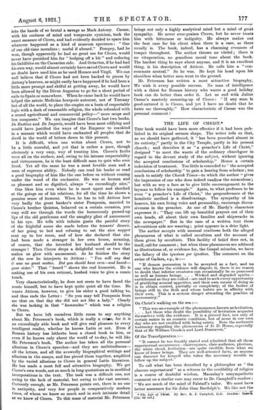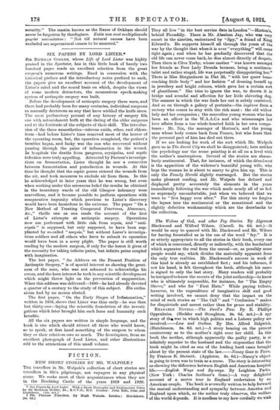1.lit LIFE OF CHRLST.•
THIS book would have been more effective if it had been pub- lished in its original sermon shape. The writer tells us that, as we should have gathered, it " has been preached almost in its entirety," partly in the City Temple, partly in his present church ; and describes it as " a preacher's Life of Christ," designed " to meet the wants of the ordinary churchgoer in regard to the devout study of the subject, without ignoring the accepted conclusions of scholarship." Hence a certain indecision of treatment. Too little is conceded to the accepted conclusions of scholarship " to gain a hearing from scholars ; too much to satisfy the Church Times—to which the author ‘, gives
the impression of one who does indeed swallow the miraculous ; but with so wry a face as to give little encouragement to the layman to follow his example." Again, to what professes to be even " a preacher's Life of Christ," the preponderance of the homiletic method is a disadvantage. The sympathy of his hearers, his own living voice and personality, encourage discur- siveness in the preacher. As one of Mr. Hardy's characters expresses it : " They can lift up beautiful prayers out of their own heads, all about their own families and shipwracks in the newspaper." But in the case of a written text these adventitious aids are wanting ; print appears in a drier light. The author accepts with unusual readiness both the alleged phenomena of what is called occultism and the account of them given by occultists. This facility of belief does not, in itself, call for comment ; but when these phenomena are adduced as illustrations of, or evidence for, the Gospel miracles, we have
the fallacy of the ignotum per ignotius. The comment on the swine of Gadara, e.g., is :— " If demon possession is to be accepted as a fact, and no one who knows the evidence will dispute it, there is no reason to doubt that inferior creatures can occasionally be so possessed as well as human beings. . . . Wicked and degraded spirits— earthbound as they are called—are said to seek every opportunity of gratifying sensual appetites, and their own means of doing so is to obtain control, partially or completely, of tho bodies of beings still in the flesh and whose habits are in affinity with their own, This is a serious danger attending the practice of necromancy."
On Christ's walking on the sea :- "This was an example of the phenomenon known as levitation. . . . Let those who doubt the possibility of levitation acquaint themselves with the evidence. It is a proved fact, not only of certain saints in an ecstatic condition, but of some in our own day who are not credited with being saints. Note the authentic testimony regarding tho phenomena of D. D. Homo, especially that of Sir William Crookos and Lord Dunraven."
Of the Transfiguration :— " It cannot be too frankly stated and admitted that all those supernormal occurrences—clairvoyance, clair-audience, photism, the white cloud, levitation—are quite credible from what we know of lesser beings. They are well-attested facts, as anyone can discover for himself who takes the necessary trouble to follow up the subject."
To call what has been described by a philosopher as " the
obscene supernatural " as a witness to the credibility of religion is a course of doubtful wisdom. Macaulay's unsympathetio comment on a similar case may occur to Dr. Campbell's readers : " We are much of the mind of Falstaff's tailor. We must have better assurance for Sir John than Bardolph's. We like not the
• The Life of Christ. By Bev. B. I. Campbell, D.D. London : CsM [129. Od net.l security." The maxim known as the Razor of Ockham should never be forgotten by theologians. Entia non suet multiplicanda practer necessitatem : Not till natural causes have been es:chided are supernatural causes to be assumed."



































 Previous page
Previous page